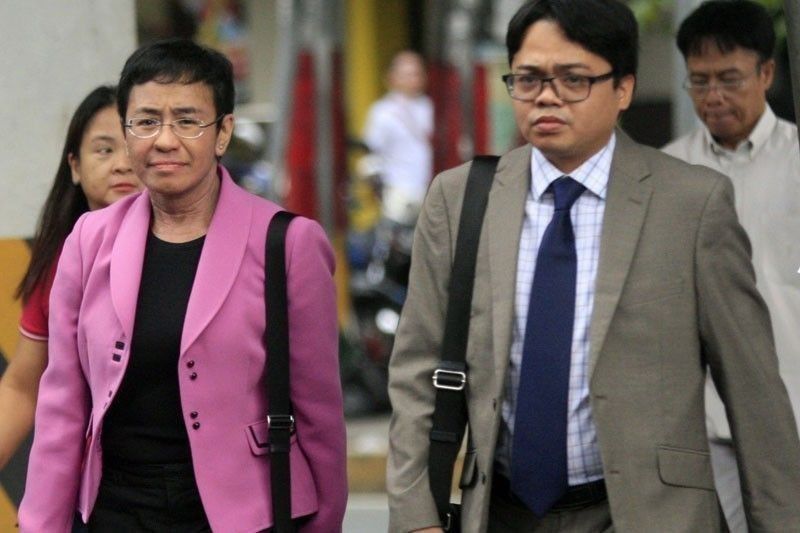NBI arrests Rappler CEO Maria Ressa

MANILA, Philippines (Update 3 10:27 p.m.) — Agents of the National Bureau of Investigation arrested Rappler CEO Maria Ressa at her Manila office on Wednesday in what press freedom advocates branded an act of "persecution."
Rappler news editor Miriam Go said that NBI agents entered their building at past 5 p.m. to serve an arrest warrant on Ressa. Government office hours are from 8 a.m. to 5 p.m. although warrants can be served at any time.
Agents of the NBI arrived at the office past government office hours, including court hours. This means that if the warrant has been served, Ressa would have to be detained overnight. She could post bail when the court that issued a warrant opens on Thursday morning.
Her detention on a cyberlibel charge is a dramatic escalation in government pressure bearing down on Ressa and her website Rappler, which was already facing tax evasion charges that could shut it down.
It comes after Duterte has cracked down on high-profile critics in the press and legislature who dared oppose his signature anti-drug campaign that has killed thousands.
According to the copy of the warrant of arrest posted by the news site, Manila Regional Trial Court Branch 45 Presiding Judge Rainelda Estacio-Montesa ordered the serving of the warrant against Ressa.
The order was dated February 12.
They tell us to stop taking videos. We won't," Go said.
A video posted by Rappler multimedia reporter Aika Rey showed an NBI agent attempting to get her phone and asking her to stop recording.
Rey said she asked the officer why she was not allowed to record and was told: "because I say so."
A live video feed from the office has since been cut.
Ressa: 'Case is ridiculous'
Asked which case the warrant emanated from, Justice Secretary Menardo Guevarra said: "Whichever case it may be, it is surely bailable."
READ: Timeline: How the Rappler case developed
Ressa, who was named a Time Magazine "Person of the Year" in 2018 for her journalism, left the Rappler offices with plain-clothes officers and surrounded by cameras.
"The case is ridiculous and the fact that they issue an arrest warrant is a travesty of justice," Ressa told journalists after her arrest.
"This is what journalists in the Philippines now have to go through," she added.
Later, Rappler announced in a tweet that Ressa would have to spend the night at the National Bureau of Investigation, the unit which detained her, as lawyers tried to find a court to post bail.
State prosecutors on January 10 indicted Rappler, Ressa and former reporter Reynaldo Santos Jr. on cyberlibel over an article about businessman Wilfredo Keng that was published in 2012.
Keng went to the National Bureau of Investigation in October 2017, more than five years since the story was published, saying that Rappler did not observe “ethical standards of journalism” when it published the story.
Santos, who was then part of Rappler's investigative arm, reported in 2012 that Keng lent his sport utility vehicles to Chief Justice Renato Corona who was facing an impeachment case in the Senate. Corona was later removed from office.
While investigators initially dismissed the businessman's 2017 complaint about the article, the case was subsequently forwarded to prosecutors for their consideration.
In resolving the complaint, the panel of prosecutors held that the assailed article is “clearly defamatory” and “is presumed to be malicious.”
They also dismissed Rappler’s defense that they could not be charged with cyberlibel as the law was not yet in effect when the article was published.
They held that while the first publication of the article on May 29, 2012, was not covered by the Cybercrime Act of 2012, the story’s publication on Feb. 19, 2014, puts it under the “multiple publication rule.”
“Accordingly, we hold that the republication of the article as may have been modified or revised is a distinct and separate offense, for which the author, respondent Santos, should be prosecuted,” the resolution further read.
RELATED: A look at the cyber libel charge vs Rappler, Maria Ressa
'Forcibly silence critical media'
Philippine journalists immediately attacked the surprise serving of the warrant at Rappler headquarters.
"The arrest of ... Ressa on the clearly manipulated charge of cyberlibel is a shameless act of persecution by a bully government," said the National Union of Journalists of the Philippines.
"The government ... now proves it will go to ridiculous lengths to forcibly silence critical media," it added.
Amnesty International also swiftly condemned the arrest as "brazenly politically motivated".
"In a country where justice takes years to obtain, we see the charges against her being railroaded," the group said in a statement.
The Philippines tumbled six places last year in Reporters Without Borders rankings of press freedom to 133rd out of 180, with the body noting the government has pressured and silenced critics.
Duterte has lashed out at other critical media outfits, including the Philippine Daily Inquirer and ABS-CBN.
He had threatened to go after their owners over alleged unpaid taxes or block the network's franchise renewal application.
'Nothing to do with freedom of expression'
Some of the drug crackdown's highest-profile detractors have wound up behind bars, including Sen. Leila de Lima, who was jailed on drug charges she insists were fabricated to silence her.
Ressa insists the site is not anti-Duterte, saying it is just doing its job to hold the government to account.
The law that forms the foundation of the case takes aim at various online offenses, including computer fraud and hacking.
Presidential spokesman Salvador Panelo said the cases against Ressa had nothing to do with her work as a journalist.
"This has nothing to do with freedom of expression or the press," he told broadcaster ABS-CBN. "Regardless of who commits any crime, he or she will be charged in accordance with the law."
READ: Panelo: Ressa’s arrest ‘nothing to do with freedom of expression’
In the tax case, the government accuses Rappler Holdings Corp., Ressa and the site's accountant of failing to pay taxes on 2015 bond sales that it alleges netted gains of P162.5 million ($3 million).
The Philippine justice system is notoriously overburdened and slow, with even minor cases taking years to be judged. — with Agence France-Presse
Related video:
- Latest
- Trending






























